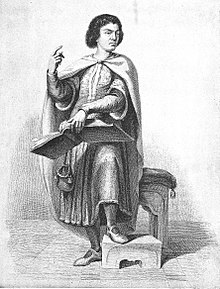
Back مذهب تصوري Arabic Концептуализъм Bulgarian Conceptualisme Catalan Konceptualisme Danish Konzeptualismus German Conceptualismo Spanish Kontseptualism Estonian Kontzeptualismo Basque مفهومگرایی Persian Konseptualismi Finnish

In metaphysics, conceptualism is a theory that explains universality of particulars as conceptualized frameworks situated within the thinking mind.[2] Intermediate between nominalism and realism, the conceptualist view approaches the metaphysical concept of universals from a perspective that denies their presence in particulars outside the mind's perception of them.[3] Conceptualism is anti-realist about abstract objects, just like immanent realism is (their difference being that immanent realism accepts there are mind-independent facts about whether universals are instantiated).[4]
- ^ Laos, Nicolas (2015). The Metaphysics of World Order: A Synthesis of Philosophy, Theology, and Politics. Wipf and Stock Publishers. p. 37. ISBN 9781498201025.
- ^ Cite error: The named reference
Conceptualismwas invoked but never defined (see the help page). - ^ Cite error: The named reference
universalswas invoked but never defined (see the help page). - ^ Neil A. Manson, Robert W. Barnard (eds.), The Bloomsbury Companion to Metaphysics, Bloomsbury, 2014, p. 95.
© MMXXIII Rich X Search. We shall prevail. All rights reserved. Rich X Search